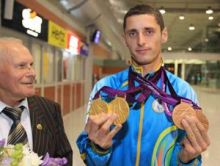This is a bit strange for a country of such a size, such a GDP, such a share of the young population, such a government, and such a small economy…
We were among the countries that grabbed a heap of medals at the two last Olympic Games (11th and 14th places among the 80 countries that won at least some medals). And we came in fourth best at the London 2012 Paralympics, only slightly trailing behind the British who were third.
It turned out that we have a lot of good athletes.
For example, we have two heavyweights who have been dominating the heavyweight division of the world professional boxing and one very young athlete, aged seven, who can do 4,000 pushups in two and a half hours.
We also have a lot of other prominent sportsmen, great soccer players, for example, who often disappoint us if not with their play then with their political preferences.
But, on the whole, we are a nation of great sportsmen.
And it was not always clear to me why.
The Cossack blood?
Is the gene of our indefatigable and brave ancestors still living in us? Then why are there so many inglorious, sinister, manipulative, mendacious, cowardly, weak, shameless, and worthless people around? Just look at the Verkhovna Rada… Well, there are too few sportsmen there. In parliamentary brawls, they immediately grip the throat of and beat up the weakest.
No sportsmanship at all.
Yes, heredity plays a role in good physical competitiveness. But there is also another important factor that towers above all the other: above good genes, a good coach, a sensible family and the government, which teaches you to go in for sport instead of drinking.
This factor is the extent to which a sportsman can stand up to pain.
This is the main thing.
It is extremely important in any sporting career to be able to endure the pain which the body sends out when you overwork and to turn it to good account. This is the difference between a prominent sportsman and a nobody.
This is why the success of our Paralympians in London is so significant in this light. The physically handicapped, who compete at such a level, have to endure twice as much pain.
Luckily, they, like all the Ukrainians, have got used to pain.
Very few nations have had a less painful history.
It is often said that the Ukrainian essence is obedience – to God, parents, tradition, and your own exacting wife, that Ukrainians are timeservers rather than revolutionaries in spite of the rebellious traits which the free and boundless Cossack steppes planted in their nature. They know how to check a revolt in themselves until a more suitable time and how to withstand a difficult destiny.
Rilke once said: “Who speaks of victory? Enduring is everything.”
This might as well be about us.
The Ukrainians know how to survive and, hence, they know very well about suffering and pain. And they know: one can live with pain because they have learned to be friends with it.
My old friend Yevhen, together with whom I used to “buff up muscles” in a Kyiv basement sport room in the young years, says that one should begin jogging after the age of 40. This time has come. He suggests longer distances because “you can then run away from boredom as far as possible.” He points to a distant dune which I can barely see on the Atlantic seashore, where we and our families laze around, and says: ‘Over there.”
We run up to the dune an hour later – he shows a customary sporting enthusiasm, while I feel pain all around my body and moan.
Yevhen laughs and says that pain can be very useful to everybody.
Leopold von Sacher-Masoch, who was born in Lviv, knew this very well.







